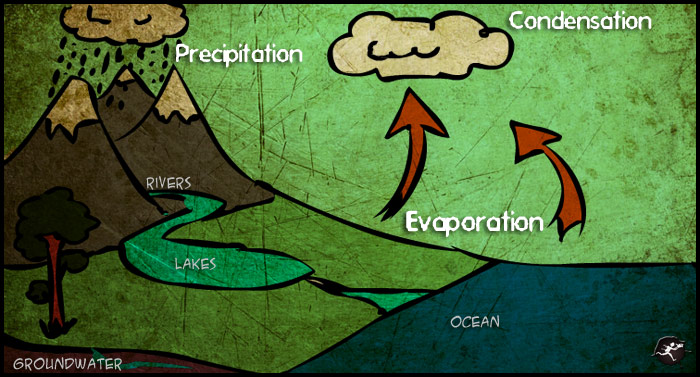The Amazing Water Cycle
The water that we have on Earth exists in many forms. The oceans, rivers, lakes and streams have liquid water flowing through them. Glaciers and ice-caps contain solid water in the form of ice. The atmosphere has water vapor in it – hence the clouds. Even the ground we walk on is full of water. Some of it flows underground, dissolving rocks and making caves as it goes. To help explain the water cycle, we produced a video about it:
Facts about the Water cycle
- The water cycle is a process that helps give us water to drink, fish to eat and the weather patterns that allow us to grow crops.
- A whopping 97% of the water on Earth is saltwater from the ocean. Only 3% of our water is freshwater
- Ice makes up 2% of the available water, leaving only 1% of the water on Earth available for humans and animals.
Water Cycle Terms
Water Cycle Terms
Water Cycle Terms
Water Cycle Terms
- Evaporation: Occurs when liquid water vaporizes back into a gas.
- Condensation: A physical change of the liquid water from gas back to liquid. Cloud formation is a good example of condensation.
- Precipitation: Occurs when teh condensed water in the atmosphere falls as rain, snow, or sleet.
- Transpiration: A loss of water vapor from plants. Plants have stomata on their surfaces whereby water is lost to the atmosphere.
Here is a song to help you remember the water cycle!
Related Topics
The water that we have on Earth exists in many forms. The oceans, rivers, lakes and streams have liquid water flowing through them. Glaciers and ice-caps contain solid water in the form of ice. The atmosphere has water vapor in it – hence the clouds. Even the ground we walk on is full of water. Some of it flows underground, dissolving rocks and making caves as it goes. To help explain the water cycle, we produced a video about it:
Facts about the Water cycle
- The water cycle is a process that helps give us water to drink, fish to eat and the weather patterns that allow us to grow crops.
- A whopping 97% of the water on Earth is saltwater from the ocean. Only 3% of our water is freshwater
- Ice makes up 2% of the available water, leaving only 1% of the water on Earth available for humans and animals.
Water Cycle Terms
Water Cycle Terms
Water Cycle Terms
Water Cycle Terms
- Evaporation: Occurs when liquid water vaporizes back into a gas.
- Condensation: A physical change of the liquid water from gas back to liquid. Cloud formation is a good example of condensation.
- Precipitation: Occurs when teh condensed water in the atmosphere falls as rain, snow, or sleet.
- Transpiration: A loss of water vapor from plants. Plants have stomata on their surfaces whereby water is lost to the atmosphere.
Here is a song to help you remember the water cycle!

































































































